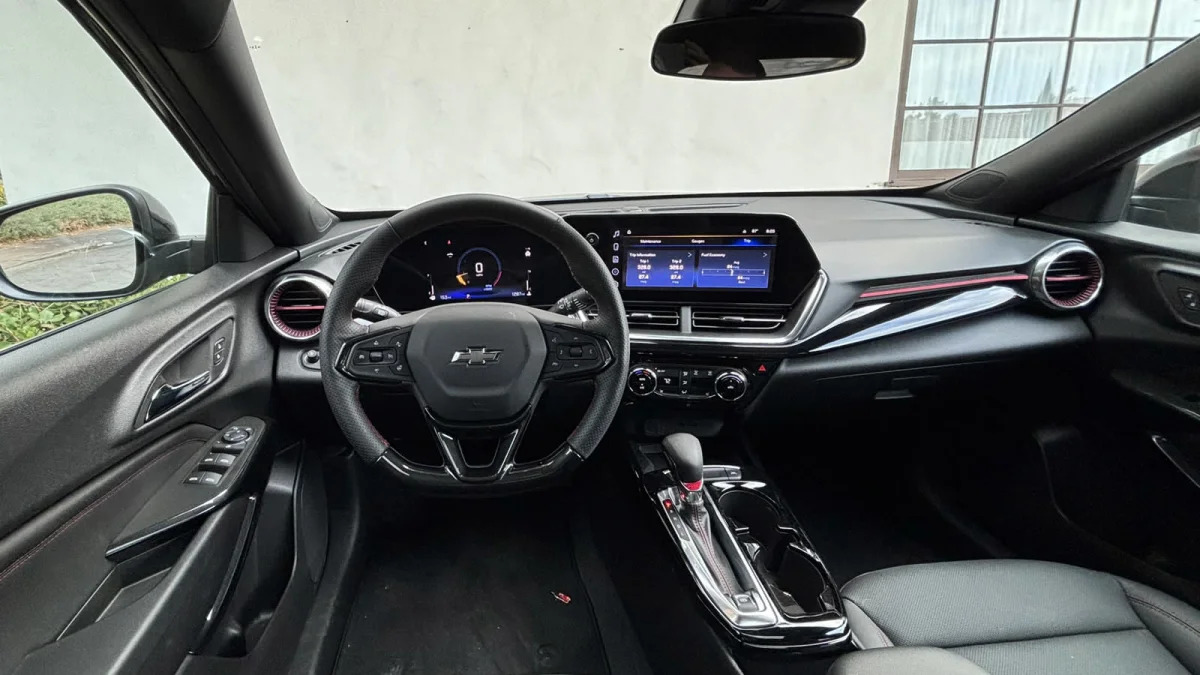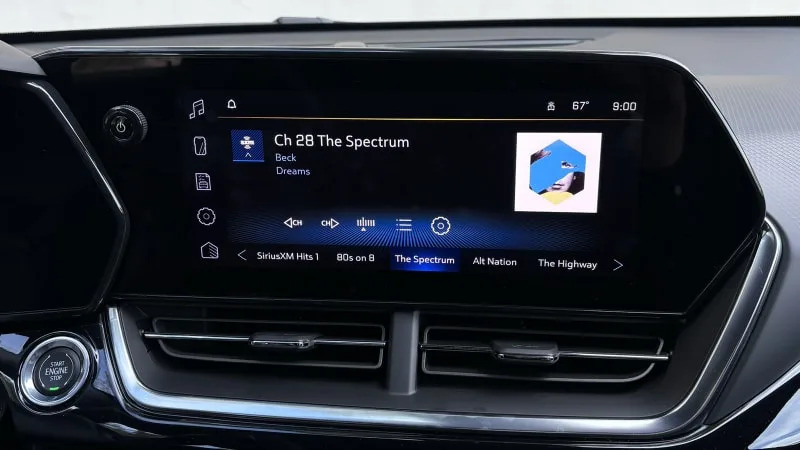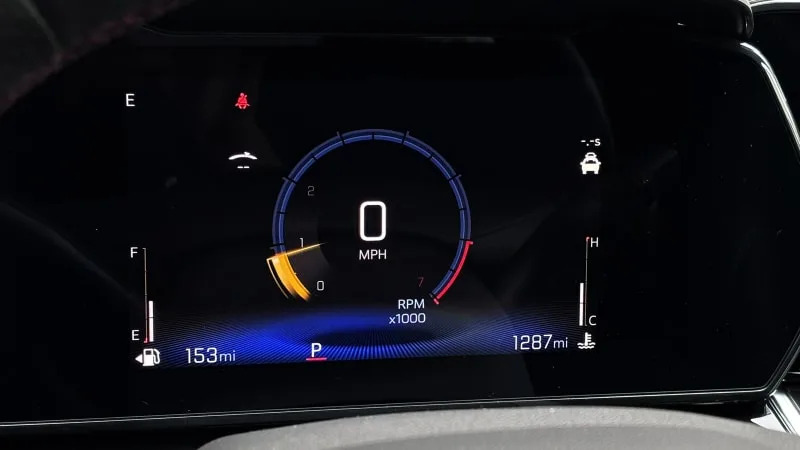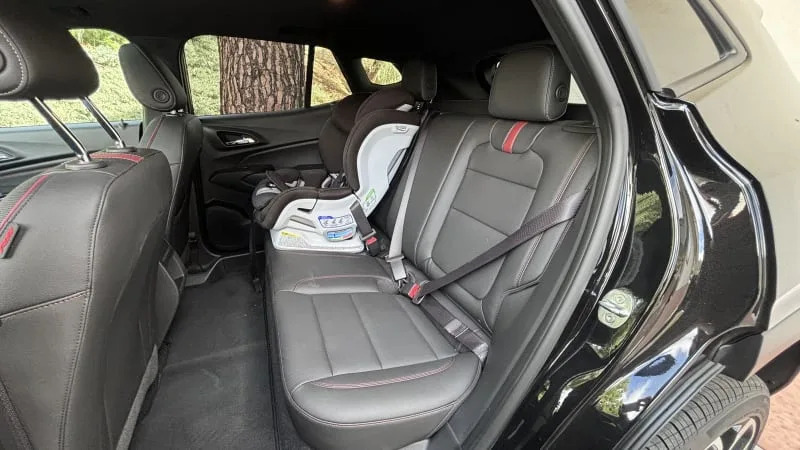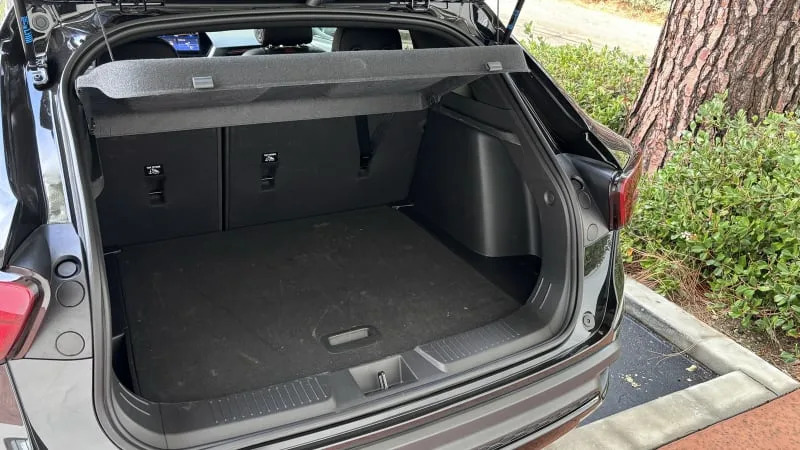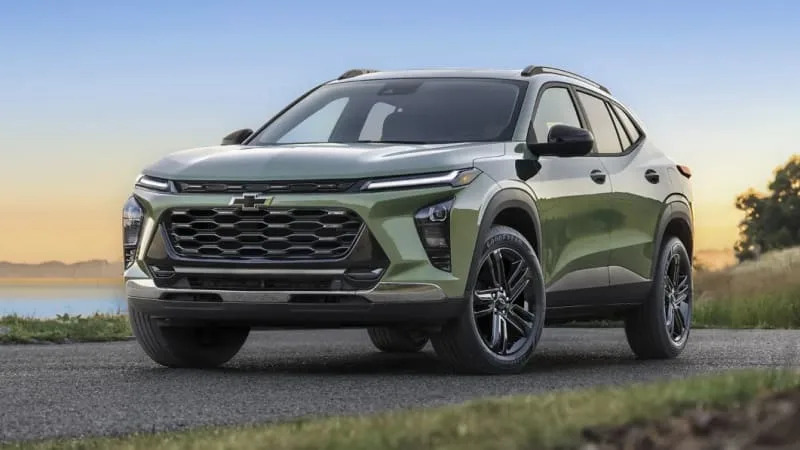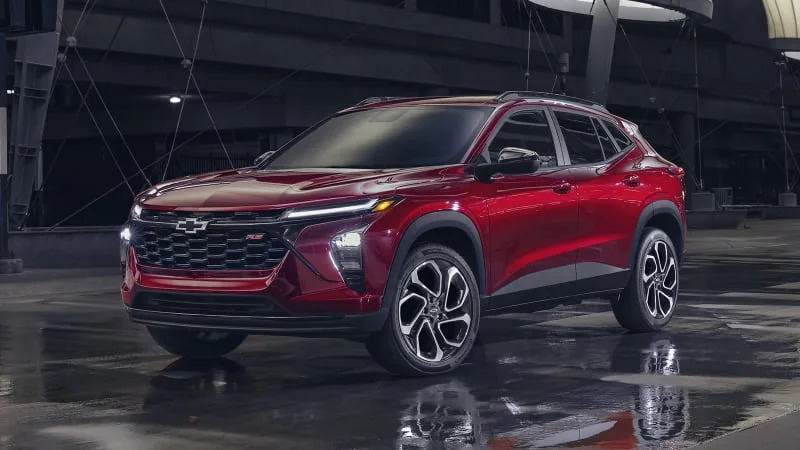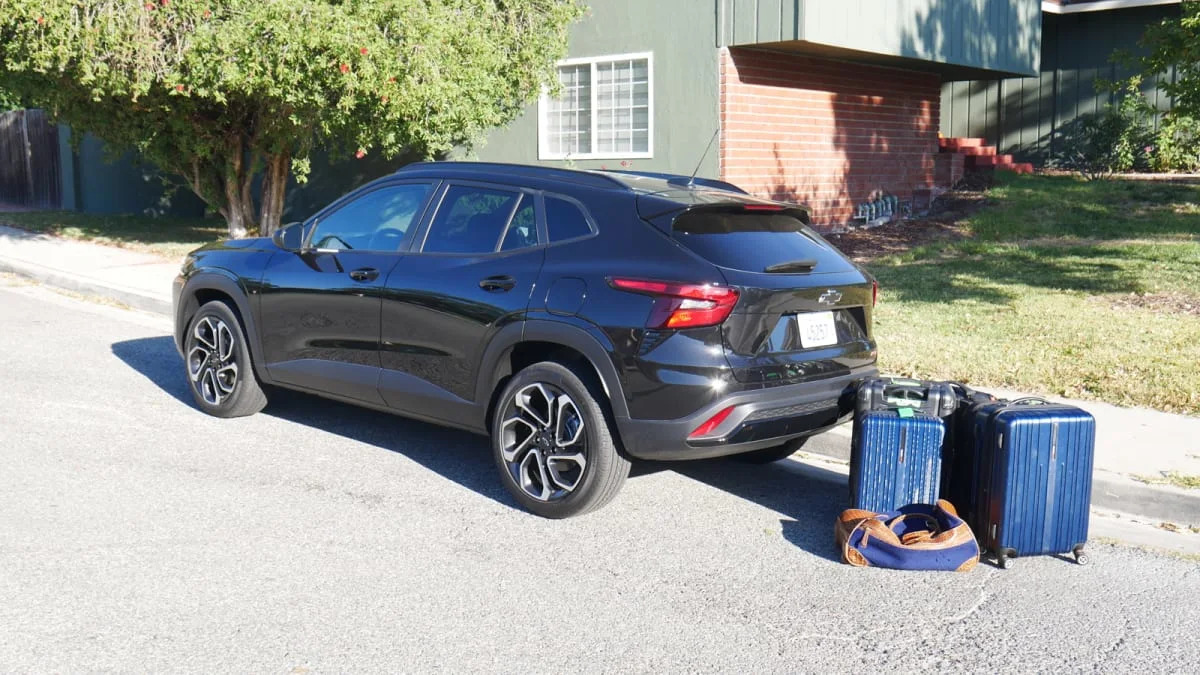Pros: Strong value; sharp looks; surprisingly practical; engaging and even enjoyable to drive; high fuel economy
Cons: All-wheel drive unavailable; no engine upgrade; hard armrests
The 2024 Chevrolet Trax is a game-changer for its brand, its subcompact SUV segment and for affordable cars in general. It is objectively well-executed, subjectively great to look at and, crucially, one heckuva deal that makes others in its segment seem overpriced. Even value stalwart Kia is looking down at the Trax from up the price ladder. And sure, there are fundamental reasons why it costs less, which we’ll get to, but on the whole, we think most buyers will be fine sacrificing in those areas to benefit from that sharp style and strong value.
For starters, the Trax has more passenger space than most subcompact SUVs. Full-size adults can sit comfortably front to back, and you don’t need to scoot the front passenger seat uncomfortably forward to accommodate a rear-facing child seat or kicking feet in a forward-facing one. Cargo space is above average, too. The cabin design is sporty and packed with the necessities, which draw attention away from the cheaper, hard plastics — this would be one of those sacrifices mentioned earlier.
Another would be its small engine, which on paper, at least, delivers slow acceleration even in a segment consisting of leisurely sprinters. In practice, though, it doesn’t feel that slow thanks to punchy low-end power from the little turbo-three engine and quick reactions from the six-speed automatic. It’s further balanced by an overall dynamic package that is genuinely enjoyable to drive. Slow cars can be fun, and inexpensive cars can be good, period. The 2024 Chevy Trax satisfies both.
Interior & Technology | Passenger & Cargo Space | Performance & Fuel Economy
What it’s like to drive | Pricing & Trim Levels | Crash Ratings & Safety Features
What’s new for 2024?
We very nearly wrote “The Chevy Trax is an all-new model for 2024,” completely forgetting there actually was a Trax before. It’s just this one’s much different. And more memorable. And better.
What are the Trax interior and in-car technology like?
Almost every surface in the Trax cabin is hard plastic or a too-hard rubbery surface. That’s bad news for elbows (please, more padding!), but it’s mostly disguised by a handsome design that shares plenty of visual DNA with the Camaro. It also helps keep the price low. Functionality is excellent, with a large phone-holding bin (available with wireless charging in the top three trim levels), generous cupholders split by another phone holder, a decent-sized armrest bin and a bonus bin to stash whatever. Door pockets are large, too, and can accommodate bottles.
From a tech perspective, the Trax features a de-contented version of GM’s Android-based infotainment system. Available in either 8- or 11-inch sizes, it looks good and is easy to use even if it doesn’t do much more than tune the radio, display trip computer info, alter vehicle settings and operate standard wireless Apple CarPlay and Android Auto. Honestly, most people don’t need more than that. The instrument panel is a screen in the top three trim levels, too, and although it lacks the sort of functionality and customized graphics options of other all-digital panels, it looks good and is more easily read than the standard analog gauges. The 11-inch touchscreen and digital instrument panel are pictured below.
How big is the Trax?
The Trax isn’t quite as big on the outside as the mechanically related and similarly impressive Buick Envista, but it’s still considerably bigger on the outside than other subcompact SUVs. It’s a half-foot longer than a Kia Seltos, itself no tiny thing, and nearly 3 inches longer than the VW Taos. The Trax isn’t as tall, however, particularly in the cargo area, which negates some of that overall length. It does contribute to the Trax looking so low, sleek and sporty, however.
Inside, the Trax puts this comparatively large exterior footprint to good use with a big back seat that lets full-size adults sit front and back. Headroom isn’t an issue despite that low, sleek roofline, either. Unlike most subcompact SUVs, the Trax is a totally viable family vehicle thanks to this ample rear legroom that won’t force the front passenger to scoot uncomfortably forward to make way for children in car seats behind.
Now, we found that the cargo area isn’t as large and useful as its official 25.6-cubic-foot volume would imply. In fact, we managed to more easily load six suitcases into the Envista despite it having less space on paper. The Seltos, Taos, Nissan Kicks, Kia Niro and Subaru Crosstrek also performed better. The Chevy Trailblazer was notably worse, though.
What are the Trax fuel economy and performance specs?
Every Trax is powered by a 1.2-liter turbocharged three-cylinder engine that sends 137 horsepower and 162 pound-feet of torque through a six-speed automatic to the front wheels only. All-wheel drive is not available.
Fuel economy estimates are 28 mpg city, 32 mpg highway and 30 mpg combined. We only managed 27.4 mpg in over 300 miles of mixed driving, which may be the result of small turbo engines being more susceptible to a heavy foot … which we have.
Trax Activ (green) and Trax 2RS (red)
What’s the Trax like to drive?
Much like the mechanically related Buick Envista, the Trax’s powertrain specs sound totally lame. Three cylinders? 137 horsepower? Six-speed automatic? We didn’t even mention that the 0-60-mph sprint is somewhere in the 9s, making it one of the slowest cars in the segment. The thing is, you’d never know it by driving it. This is a good powertrain that’s been thoughtfully applied to this car to simultaneously assure a low price, good fuel economy and elevated refinement.
It starts with the engine itself. Forget the horsepower – those 162 pound-feet of torque come on early at 2,500 rpm, ensuring a punchy power delivery around town and when jumping into a faster lane of traffic. That six-speed automatic may sound antiquated, but it’s quick to respond and is more likely to find itself in the right gear (unlike eight-, nine- or 10-speed units), doesn’t stutter to engage (unlike a DCT) and doesn’t depressingly drone (unlike a CVT). The engine itself also sounds pretty good, with a muffled snarl reminiscent of a playful dog tugging on a rope.
The little-engine-that-could is also balanced by the rest of the driving experience, which is excellent. We genuinely enjoyed driving the Trax, starting with steering that’s responsive and relatively feelsome. The suspension behaves in a far more sophisticated manner than is expected in this segment, maintaining composure and grip on our mountain road test route, while providing a comfortable ride everywhere else. Now, it’s certainly on the “sporty” and “firmer” side of the comfort scale, especially with the available 19-inch wheels, so make sure to find some bumps on a test drive. Should it be a touch too firm, try out a version with smaller wheels, or the softer-sprung Envista.
What other Chevrolet Trax reviews can I read?
Chevrolet Trax Luggage Test
Take a deep dive into how much actual stuff can fit inside the Trax’s cargo area and how it compares with the mechanically related Buick Envista.
What is the 2024 Trax price and where is it built?
The Trax is built in South Korea, which is likely another way GM managed to keep the price down. It starts at a budget-friendly $22,590, including the $1,095 destination charge.
Although upper trim levels certainly get more equipment, the gap isn’t that significant, which is consistent with the similarly modest gap in pricing between the cheapest and most expensive trim levels. Instead, the trim levels largely differ in style. The LS and LT are more conservative and traditional; the 1RS and 2RS are the sporty, Camaro-esque ones with differing levels of equipment; and the Activ is a different, arguably more modern take on sporty.
All prices below include the $1,095 destination charge, and again, all-wheel drive is not available.
LS: $22,590
1 RS: $24,290
LT: $24,490
2 RS: $26,090
Activ: $26,090
What are the Trax safety ratings and driver assistance features?
Every Trax comes standard with forward collision warning with automatic emergency braking and pedestrian detection, lane-departure warning and lane-keeping assist. The Driver Confidence Package adds blind-spot and rear cross-traffic warning system, adaptive cruise control and rear parking sensors.
The new Trax had not been crash-tested by a third party at the time of this writing.


